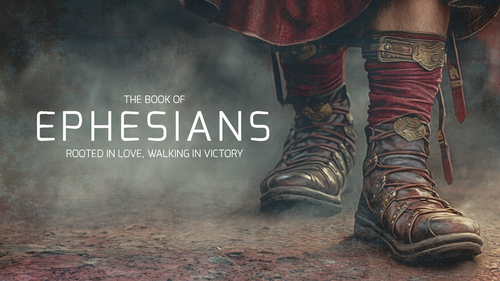Ephesians 1:1-2 — Prologue

Ephesians is an amazing letter. Its theological content ought to be read and studied by every new believer because it is so foundational to the Christian faith. Yet its theological depth is so profound that even the most seasoned theologian will never master its depths.
The book begins by teaching us that the study of theology and doctrine should never be separated from the praise and adoration of our awesome God, who has done so much for us.
Throughout this beautiful expression of what God has accomplished for us in Christ, the Apostle Paul repeatedly inserts praises to the glory of God—which ought to be our response as well.
Range of Topics
The six chapters of Ephesians cover an extraordinary range of topics with clarity, care, and beauty. Here are a few of these:
Purpose
Although there doesn't seem to be a conflict or a glaring problem that has prompted the Apostle Paul to write this letter, there does seem to be a hint of ongoing tensions between Jews and Gentiles in the church. The Apostle Paul also continues to be concerned about the Ephesians believers who were converted from a background of magical practices and allegiance to other deities to become more deeply rooted in their relationship to Christ and His power. The worship of the goddess Artemis (also known as Diana) was uniquely prominent in Ephesus.
The influence of her cult permeated every aspect of Ephesian life. Her titles include “Queen of Heaven”, “Lord”, and "Savior.” Her cult claimed that she wielded power and authority over heaven, earth, and even the underworld.
On the return from his third missionary journey, the Apostle Paul told the Ephesian elders at Miletus to beware of evil teachers from without and within who would teach perverse things (Acts 20:29–30). From the Book of Revelation, we can see that the Ephesian church had succeeded in keeping out the false teachers (Rev. 2:2) but had failed to maintain their first love for Christ (Rev. 2:4). This is further substantiated in 1 Timothy 1:5 when Paul wrote to Timothy at Ephesus that the goal of his instruction was “love which comes from a pure heart and a good conscience and a sincere faith.”
It is clear that the theme of love needed to be stressed for the saints in Ephesus.
This is in harmony with the contents of Ephesians where 19 of the 107 times Paul used the verb or noun “love” are in Ephesians. Thus more than one-sixth of his references to “love” appear in this small epistle to the Ephesians. This letter begins with love (Ephesians 1:4, 6) and ends with love (Ephesians 6:23–24).
Major Divisions
No other Pauline epistle has such a clear major division. The first three chapters emphasize what we ought to believe; the last three chapters emphasize how we should live in response to that belief. Ephesians makes it clear that emphasizing behavior (mere morality and ethics) that is not grounded in who God is and who we were, what God did, and who we are now as a response to His redemption, creates legalistic Christians who have forgot their first love.
Are you walking in truth and love?
The two cannot be separated!
The book begins by teaching us that the study of theology and doctrine should never be separated from the praise and adoration of our awesome God, who has done so much for us.
Throughout this beautiful expression of what God has accomplished for us in Christ, the Apostle Paul repeatedly inserts praises to the glory of God—which ought to be our response as well.
Range of Topics
The six chapters of Ephesians cover an extraordinary range of topics with clarity, care, and beauty. Here are a few of these:
- How is a new believer discipled and trained in the ministry.
- The seeming paradox of God's sovereignty and man's free will.
- Spiritual warfare
- The distinct roles of the husband and wife in marriage.
- Relations between different people groups.
- God’s design and plan for the church.
- The basis for Christian unity
- Living in a context of religious pluralism
- Spiritual gifts
- The role of the Mosaic Law
Purpose
Although there doesn't seem to be a conflict or a glaring problem that has prompted the Apostle Paul to write this letter, there does seem to be a hint of ongoing tensions between Jews and Gentiles in the church. The Apostle Paul also continues to be concerned about the Ephesians believers who were converted from a background of magical practices and allegiance to other deities to become more deeply rooted in their relationship to Christ and His power. The worship of the goddess Artemis (also known as Diana) was uniquely prominent in Ephesus.
The influence of her cult permeated every aspect of Ephesian life. Her titles include “Queen of Heaven”, “Lord”, and "Savior.” Her cult claimed that she wielded power and authority over heaven, earth, and even the underworld.
On the return from his third missionary journey, the Apostle Paul told the Ephesian elders at Miletus to beware of evil teachers from without and within who would teach perverse things (Acts 20:29–30). From the Book of Revelation, we can see that the Ephesian church had succeeded in keeping out the false teachers (Rev. 2:2) but had failed to maintain their first love for Christ (Rev. 2:4). This is further substantiated in 1 Timothy 1:5 when Paul wrote to Timothy at Ephesus that the goal of his instruction was “love which comes from a pure heart and a good conscience and a sincere faith.”
It is clear that the theme of love needed to be stressed for the saints in Ephesus.
This is in harmony with the contents of Ephesians where 19 of the 107 times Paul used the verb or noun “love” are in Ephesians. Thus more than one-sixth of his references to “love” appear in this small epistle to the Ephesians. This letter begins with love (Ephesians 1:4, 6) and ends with love (Ephesians 6:23–24).
Major Divisions
No other Pauline epistle has such a clear major division. The first three chapters emphasize what we ought to believe; the last three chapters emphasize how we should live in response to that belief. Ephesians makes it clear that emphasizing behavior (mere morality and ethics) that is not grounded in who God is and who we were, what God did, and who we are now as a response to His redemption, creates legalistic Christians who have forgot their first love.
| Chapters 1-3 | Chapters 4-6 |
| Our Position | Our Passion |
| Our Blessings | Our Behavior |
| Heavenly Calling | Earthly Conduct |
| Doctrine | Duty |
| Theoretical Knowledge | Applied Knowledge |
| Calling | Conduct |
| Orthodoxy | Orthopraxy |
Are you walking in truth and love?
The two cannot be separated!
Posted in Ephesians
Recent
Habakkuk 2:4b — The Just Shall Live By Faith
February 20th, 2026
Habakkuk 1:12–2:1— Appealing to the Throne of God
February 13th, 2026
Habakkuk: Trusting God in Troubled Times
February 6th, 2026
John 20:18–31 — Believing is Seeing
January 16th, 2026
John 20:1–17 — Love Turns Grief into a Mission
January 10th, 2026
Archive
2026
2025
October
2024
February
March
April
May
July
October
November
December
Advent 2024 Devotion: December 2Advent 2024 Devotion: December 3Advent 2024 Devotion: December 4Advent 2024 Devotion: December 5Advent 2024 Devotion: December 6John 3:16-21 — For God So Loved the WordAdvent 2024 Devotion: December 7Advent 2024 Devotion: December 8Advent 2024 Devotion: December 9Advent 2024 Devotion: December 10Advent 2024 Devotion: December 11Advent 2024 Devotion: December 12Advent 2024 Devotion: December 13Advent 2024 Devotion: December 14Advent 2024 Devotion: December 15Advent 2024 Devotion: December 16Advent 2024 Devotion: December 17Advent 2024 Devotion: December 18Advent 2024 Devotion: December 19Advent 2024 Devotion: December 20Advent 2024 Devotion: December 21Advent 2024 Devotion: December 22Advent 2024 Devotion: December 23Advent 2024 Devotion: December 24Advent 2024 Devotion: December 25
2023
January
February
March
April
May
